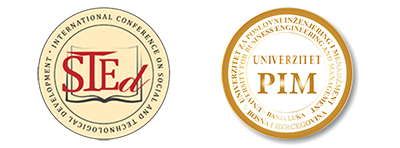OPTIMIZATION HOUSEHOLD ENERGY MANAGEMENT SYSTEM USING GWO ALGORITHM: A REVIEW
The paper provides an overview of the application of the Gray Wolf Optimization (GWO) algorithm in the management of electrical energy. Modern society cannot function without the use of electricity. In every household, there are various appliances that consume electricity, some of which are larger while others are smaller consumers. The main ...
By Olga Ristić, Milan Vesković, Sandra Milunovic Koprivica, Srđan Nogo, Lidija Paunović
CHEMICAL PROPERTIES OF SHELLED AND UNSHELLED APRICOT SEEDS, PHYSICO-CHEMICAL AND ANTIOXIDATIVE CHARACTERIZATION OF OILS OBTAINED FROM THESE SEEDS
Apricot (Prunus armeniaca) is a continental stone fruit that belongs to the Rosaceae family. The aim of this work was to determine the chemical properties of shelled and unshelled apricot seeds, as well as the physico-chemical and antioxidant characteristics of the oils obtained from these seeds. The content of moisture, crude ash, crude prot...
By Staniša Latinović, Nataša Lakić-Karalić, Ladislav Vasilišin, Goran Vučič
PHYSICOCHEMICAL PROPERTIES OF CREAM CHEESE WITH THE ADDITION OF SELECTED SPICES
This study aimed to examine the influence of adding selected spices on the physicochemical properties of fresh cream cheese. Six different samples of fresh cream cheese were produced in the milk processing plant (mini cheese factory). The first sample was marked as a control, without the addition of spices, and the other five were produced wi...
By Danica Savanović, Ana Velemir, Jovo Savanović, Aleksandar Savić, Danka Babić
BUSINESS COMMUNICATION AND MANAGEMENT
The man is a piece which is in the environment of others where it can directly provide the important information that are necessary for the wise direction of its own and their activities. Many important facts are located outside of place and time or remain hidden within them. For example, the "true" or "real" attitudes, beliefs and emotions o...
By Slađana Lolić, Biljana Rađenović Kozić
SOME RESULTS IN THE APPLICATION OF THE PRINCIPLES OF CIRCULAR ECONOMY IN THE PRODUCTION OF CARDBOARD PACKAGING
The dominant model of the economy, in the world and in our country, is still a linear model, that is, a linear economy based on the assumptions that natural resources are available in abundance, easy to obtain and cheap to dispose of. In contrast to the aforementioned, the circular economy represents a regenerative economic system within whic...
By Zoran Anišić, Jelena Demko-Rihter, Marija Pantelić
TOWARDS A COMMON AGRICULTURAL AND FOOD POLICY: SUSTAINABIILITY CHALLENGES
The Common Agricultural Policy of the European Union has been widely known for more than 60 years. The aim of this joint policy is to ensure an adequate supply of food, given that after the war and years of hunger, people could not adequately enjoy the presence of a variety of foods. Current food systems are characterized by the overproductio...
By Milica Stanković, Tiana Anđelković
EUROPEAN COMMON AGRICULTURAL POLICY AND SUSTAINABLE NUTRITION TRENDS
The common agricultural policy of the European Union for the period 2023-2027 aims to stop environmental degradation and reverse it in favour of climate change mitigation, efficient use of limited natural resources and biodiversity conservation. Agriculture in the European Union (EU) is strongly influenced by the Common Agricultural Policy (C...
By Milica Stanković, Tiana Anđelković
THE INFLUENCE OF DIGITAL MEDIA ON MODERN BUSINESS
The modern era is shaped by intense competition and demanding consumers, which is why companies abandon traditional communication methods and focus on digital media imposed by the development of information technologies. The presence of the company on the Internet is not a goal, but something that is taken for granted. The attention of the ma...
By Simonida Vilić, Ilić Milana, Ajder Dajana
IMPACT OF GOLD PRICE MOVEMENT ON THE RATE OF THE RETURNS FROM INVESTMENT ACTIVITY ON FINANCIAL MARKETS
Due to the consequences caused by the crisis of the COVID-19 virus pandemic (interrupted supply chains), energy crisis, geopolitical crisis (war conflicts between Russia and Ukraine) resulting in high inflation, the working paper analyzes, tests and quantifies the impact of gold price movements on daily rates of return from investment activit...
By Marko Milošević, Ognjen Bakmaz
OBJECTIVES OF FINANCIAL REPORTING IN THE PUBLIC SECTOR
Current public sector reforms, aimed at improving its efficiency and effectiveness, require financial information that reflects the effects of business activities no only on engaged financial but on total economic resources. There is always a dilemma which of accounting models can be applied in the public sector to best meet the requirements ...
By Dragan Vukasović, Ognjen Bakmaz, Biljana Bjelica






